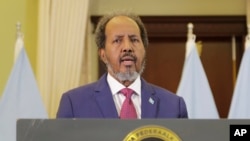Somalia said it expelled Ethiopia’s ambassador to Mogadishu and ordered the closure of two consulates – one each in the semi-autonomous Puntland region and the breakaway Somaliland region – over a dispute over the port deal.
“The Ethiopian government has blatantly interfered in Somalia’s internal affairs and violated Somalia’s independence and sovereignty,” the Somali Prime Minister’s Office said in a statement on Thursday.
The decision was taken following a cabinet meeting chaired by Prime Minister Hamza Barre in Mogadishu.
A separate statement from Somalia’s foreign ministry said it had ordered Ethiopian Ambassador Muktar Mohamed Weir to leave the country within 72 hours, effective Thursday.
Somali Information Minister Daoud Awis Jama told VOA Somali that the decision comes as Ethiopia continues to interfere in Somalia’s internal affairs.
“Today, Ethiopia has repeatedly violated Somalia’s national and territorial independence. Therefore, the government has decided to close two Ethiopian consulates and send [the] The Ethiopian ambassador to Mogadishu and his diplomatic staff returned to their country,” Avis said.
Tensions have been brewing
Tensions have been rising between Ethiopia and Somalia since the signing of a “memorandum of understanding” in January between Ethiopian Prime Minister Abiy Ahmed and Somaliland President Muse Bihi Abdi, who was visiting Addis Ababa .
Both Ethiopian and Somaliland authorities called it a “historic” preliminary agreement that would provide Somaliland a path to recognition and allow landlocked Ethiopia to access the Red Sea.
Ethiopia has said it wants to establish a naval base there and is willing to recognize Somaliland in exchange.
Somaliland has operated independently from Somalia since 1991 but is not recognized as a sovereign state by any other country.
The Somali government strongly rejected the MoU and recalled its ambassador to Ethiopia in protest.
A month later in February, Somali President Hassan Sheikh Mohammed called the deal illegal and said Somalia would “defend itself” if Ethiopia continued to implement the deal.
Mohamed also said at the time that he did not intend to expel Ethiopian diplomats from the country.
However, today’s government decision comes a day after the semi-autonomous state of Puntland, also a federal member state, announced the signing of a new cooperation agreement with Addis Ababa.
Puntland, whose relations with Mogadishu have been marred by political disputes, said days ago that it had withdrawn from the country’s federal system and would be governed independently following a dispute over constitutional changes approved by Somalia’s bicameral parliament. .
“The federal government of Somalia is responsible for the country’s foreign affairs and we consider any agreement signed by one country with another party or a region to be a clear violation of Somalia’s sovereignty,” Awis said.
In response to today’s government decision, Puntland Information Minister Mohamed Aidid Dilir accused Mogadishu of trying to exert control over “territory over which it does not govern”.
“Mogadishu has failed to eradicate terrorist groups and provide governance across the country, and now it is trying to impose its decisions on a peaceful region that does not comply with its orders. It cannot close its consulate in Puntland,” Aidid told VOA.
Somaliland’s Deputy Foreign Minister Roda Jama Elmi called Mogadishu’s decision “just a dream” in an interview with VOA Somali.
“The Mogadishu government has nothing to do with the opening of the Ethiopian consulate in Somaliland and its decision has nothing to do with us. It has no impact on Somaliland,” he said.
According to Reuters, Ethiopian Foreign Ministry spokesperson Nebiyu Tedla said that they were not aware of the Somali government’s decision.
Meanwhile, the Somali Cabinet approved the appointment of Abdullahi Mohamed Ali Sambarushi as the new director of Somalia’s National Security and Intelligence Agency (NISA) at the weekly council meeting in Mogadishu on Thursday. .
The newly appointed director previously served as NISA director twice and held other positions, including minister and ambassador. Currently, he is a member of the House of Commons.
Under the country’s constitution, prominent members of parliament who are close allies of President Mohammed will automatically lose their seats in parliament.
The new director will succeed Mahad Mohamed Salad, who resigned from the post due to personal and future political plans. Government sources, who requested anonymity, said Sala planned to run for leadership of the Galmudug region in this year’s elections.
Follow us on Google news ,Twitter , and Join Whatsapp Group of thelocalreport.in
